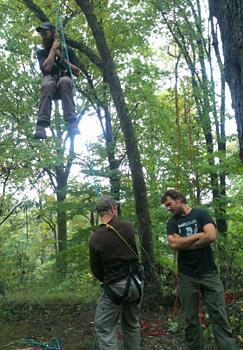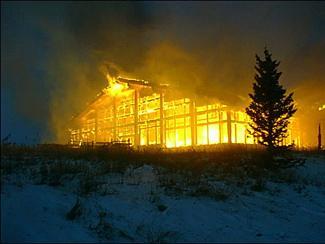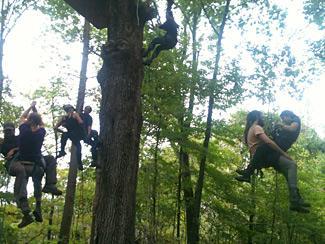By Ellen M. Gilmer
Cusi Ballew is willing to die to stop drilling.
He’s climbing a dozen feet above the soggy ground this September afternoon for practice. When the time comes, he’ll climb even higher and dare authorities to cut the ropes. A couple of slits could send him plunging 60 feet down.
That’s what it takes, he says, to draw attention to rampant natural gas development in the area.

In July, dozens of demonstrators put the tactic to work. They blocked an access road with debris and crisscrossed ropes connected to two tree sitters 60 feet up in central Pennsylvania’s Moshannon State Forest. Beyond them towered a 70-foot natural gas drilling rig, which could be accessed only by toppling the blockade and slashing the climbers’ safety lines. The resulting nonviolent standoff forced rig operator EQT Corp. to shut down for hours.
Much to the frustration of companies like EQT, these activists are growing in force, and they have made shale drilling — especially the practice of hydraulic fracturing — a top target. Across Pennsylvania, West Virginia, Ohio and outward, radical drilling critics have mobilized, united in their skepticism of an industry that has swept across the gas-rich Marcellus and Utica formations and dotted the landscape with new rigs and well pads.
Leading the drive is Earth First, an environmental movement that specializes in sit-ins, blockades, trespassing and other civil disobedience they collectively refer to as “direct action.” But others call the approach “environmental extremism,” even “ecoterrorism” — strong charges that land the activists on watch lists throughout the country.
Indeed, the movement’s motto is “No compromise in defense of Mother Earth.” But Earth Firsters at a private climbing training camp outside Athens, Ohio, last month stressed that although their methods are dynamic and, yes, radical, they are not violent.
“When people look at ‘radical,’ it’s a term that derives from getting at the root cause of things,” said camp organizer Nate Ebert, who has lived in the Athens area for eight years. “Earth First as a movement is definitely attempting to challenge the root cause of these problems that we’re having.”
That is, Earth First takes issue not just with fracking, which involves blasting chemical-laced water underground to release trapped gas, but more broadly with the country’s culture of consumption and dependence on oil, gas and coal.
“I personally don’t deny the use of fossil fuels,” Ebert said as he attempted to repair his ailing ’97 Dodge Ram. “But I certainly am trying to reduce that on a systematic level and think about it critically and don’t just blindly consume, consume, consume.”
That message can get lost among accusations of “ecoterrorism,” he said, especially when critics are broadly applying the term to any action that impedes commerce or damages property. Ballew, a fellow Earth Firster, added that detractors use the charged language as a scare tactic to generate broader condemnation of radical activism.
“Government PR has been saying that Earth First stuff is borderline or is ecoterrorism,” he said during a lunch break at climbing camp. “Just because they say that doesn’t make it so. As long as you’re operating under nonviolent principles, we don’t let that misinformation affect how we operate.”
‘Monkeywrenching’ vs. pragmatism
Ecoterrorism charges are an especially touchy subject after the downfall of some similarly minded environmentalists a decade ago. In the late 1990s and early 2000s, a core group of activists in the radical Earth Liberation Front (ELF) and Animal Liberation Front (ALF) made headlines by setting fire to logging trucks, a slaughterhouse, a government lab and, most memorably, a ski resort in Vail, Colo. By 2006, a dozen activists had been charged in the arson spree, and many are still in prison.

“It was really a big wake-up call for a lot of people that were involved in direct-action type of things,” said Bob Holland, a retired police officer from Eugene, Ore., who worked with the FBI and other agencies to track down the ELF firestarters. “I think it had a real chilling effect.”
Officially, Earth First does not advocate “monkeywrenching” — a term that describes sabotage, arson and other vandalism tactics frequently associated with radical activists. But it doesn’t condemn the practice either. The movement’s communication hub, the Earth First Journal, acknowledges that individual Earth Firsters may be taking part. It also offers a monkeywrenching field guide.
Still, the Earth First activists learning to climb trees in southeast Ohio last month gave off no air of nefariousness. Instead, they were more reminiscent of the Occupy Wall Street crowd with their general distrust of corporations and frustration with traditional channels to petition the government.
But Earth Firsters display a sharp focus the Occupy movement was accused of lacking. Activists at the Ohio climbing camp had extensive knowledge of fracking and injection wells and seemed relatively realistic about their potential impact on the energy landscape.
“It’s very sexy; it’s kind of, like, glamorous,” Ebert acknowledged, referring to Earth First’s dramatic demonstrations. “But for things to really be successful, you can’t just employ these tactics. You have to have follow up, too.
“Whether that’s follow up in the courtroom or follow up with community organizing and getting rallies together — all those things generally need to come together in some kind of formula to really move your agenda forward and get a win.”
The attendees of climbing camp were a testament to Earth First’s increasingly inclusive approach. Far from under the radar, many climbers were active in their hometowns’ local environmental groups — some “radical,” some traditional. Leaders of the Ohio camp even invited other area environmentalists to join for a day to learn basic climbing skills.
Though radical environmentalism was once defined by its contempt for “Big Green” and working within the system, the Earth Firsters in Ohio are now building alliances. But will pragmatism rub off on the radicals, or vice versa? Ebert is organizing a weekend workshop next month to train more Ohioans in direct action.
“We’re interested in letting people know that we’re taking resistance seriously and that we’re training and learning and working hard,” he said. “We’re getting more people involved, and we’re not going to back down.”
‘Party of no’?
The industry is fighting direct-action insurgence on other fronts, too. In Texas, usually relatively friendly territory for oil and gas operators, nine activists are camped out in makeshift treehouses in the path of part of the Keystone XL oil pipeline. Most of them have been there for weeks (EnergyWire, Oct. 15).

Liz Butler, who helped organize a parallel protest at the American Petroleum Institute’s headquarters in Washington, D.C., said environmentalists had simply been pushed to the limits.
“Of course people are using direct action,” said Butler, who works for the Movement Strategy Center, a group that helps organize grass-roots efforts. “They’ve tried appealing to the company, they’ve tried appealing to the government in the United States, as well as Canada, and all those things have been met with resistance.”
And ultimately, she said, that’s the impetus for any radical movement: disillusionment with the systems that run government and business. Mark Brownstein of the Environmental Defense Fund — which is as far on the spectrum of environmentalism as one can get from Earth First — says industry’s lack of transparency has fueled the dynamic actions of people like the Earth Firsters and the Texas tree sitters.
“People man the barricade when they’re frustrated,” said Brownstein, chief counsel for the energy program at EDF, which is known for its give-and-take approach with industry. “When they feel that their concerns aren’t being heard, when they feel that the problems they see aren’t being addressed, they take action.
“And the industry has given many communities and many activists plenty of reasons to be frustrated,” he added.
In turn, critics of the Earth First movement say radical activists will never be open to a dialog with industry, so it’s no use reaching out.
“They are from the party of no. The party of no never works,” said Shawn Bennett, Ohio field director for Energy in Depth, an arm of the Independent Petroleum Association of America. “It’s a very irresponsible way of doing things.”
Resistance is afoot
So, how far will Marcellus and Utica activists go? That’s a question rippling through circles of shale workers, regulators and law enforcement in the area. George Stark, spokesman for northeast Pennsylvania driller Cabot Oil & Gas Corp., said his company took note of what activists pulled off at the EQT site in Moshannon State Forest.
“Because of seeing an incident like that, we have definitely stepped up the process at the site,” he said. Cabot employs roving security officers to check on drilling rigs and well sites throughout Susquehanna County.
Bennett raised concerns last month in a blog post warning of Earth First’s weeklong training camp in Millfield.
“While some think they may just be climbing trees for a week … this is not a wholesome, run of the mill organization,” Bennett wrote. He elaborated in an interview with EnergyWire that he believed Earth First activists were a real threat to industry operations in Ohio.
“They have one mission, and their mission is to stop development,” he said. “This is not only the safety of the equipment but the safety of the employees.”
Ohioans got a taste of the direct-action approach early in the summer when activist Madeline ffitch was arrested after spending six hours chained to concrete barrels that blocked an Athens County injection well. Wastewater from local and out-of-state oil and gas operations is shipped to such disposal wells to be stored underground permanently.
Ffitch’s demonstration elicited an outsized response from emergency personnel, including several sheriff’s deputies, the Ohio Division of Wildlife, local police, the Ohio State Highway Patrol, the U.S. Department of Homeland Security and a local fire department, according to the Athens News.
That’s just one example of the trouble civil disobedience can cause, said Holland, the arson investigator in Eugene.
“Law enforcement’s been cut back so much,” he said, “and then you’ve got to go out and baby-sit these people who want to impede the development of a company.”
But supporters of direct action fiercely defend the approach as effective, necessary and even crucial to social progress.
“If you look back in history, you have moments where people feel like they’ve exhausted all the normal, polite ways of trying to address problems,” said Butler. “It’s always taken a brave set of people who are going to essentially put their bodies on the line to protect the things that they care about.”
In ffitch’s case, that effort landed her in the courtroom, fighting off a felony charge of inducing panic. In a plea bargain with the prosecution, she agreed to pay $1,500 to cover the cost of the response but promised anti-drilling activism would not waver.
Indeed, the protest in Moshannon State Forest came a month later, and smaller ones have cropped up throughout the shale-laden land since then, stretching as far as Michigan, where activists in Lansing planned to use climbing skills they picked up in Ohio to disrupt a public auction of state-owned oil and gas rights this week.
Industry, meanwhile, is left scrambling to monitor Earth First blogs and message boards to keep tabs on the movement. “Anything could happen,” EID’s Bennett cautioned.

